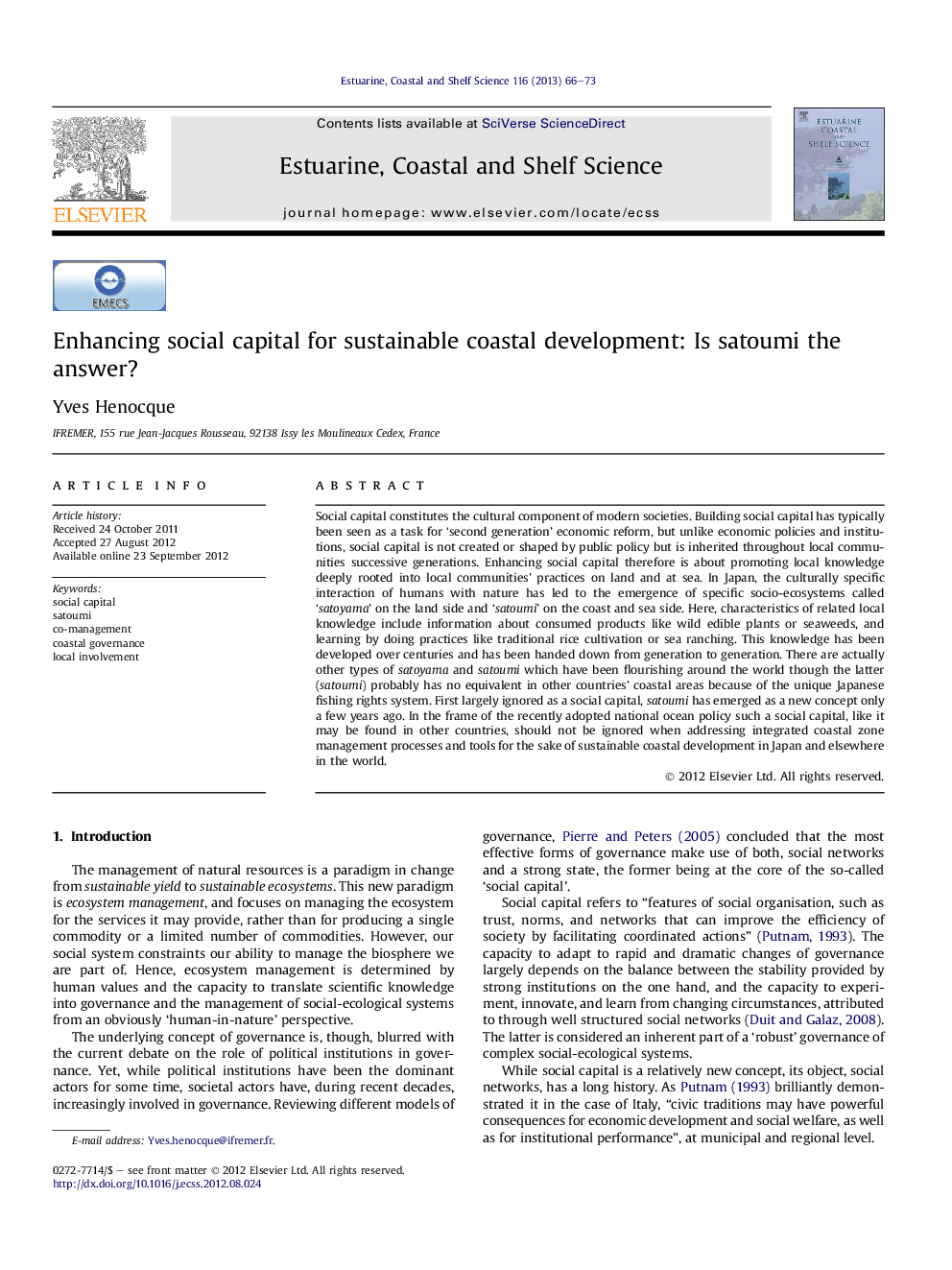| کد مقاله | کد نشریه | سال انتشار | مقاله انگلیسی | نسخه تمام متن |
|---|---|---|---|---|
| 6385130 | 1626679 | 2013 | 8 صفحه PDF | دانلود رایگان |
عنوان انگلیسی مقاله ISI
Enhancing social capital for sustainable coastal development: Is satoumi the answer?
ترجمه فارسی عنوان
افزایش سرمایه اجتماعی برای توسعه پایدار ساحلی: پاسخ ساتوم چیست؟
دانلود مقاله + سفارش ترجمه
دانلود مقاله ISI انگلیسی
رایگان برای ایرانیان
کلمات کلیدی
سرمایه اجتماعی، ساتومی، مدیریت همکاری، حکومت ساحلی، مشارکت محلی،
ترجمه چکیده
سرمایه اجتماعی جزء فرهنگی جوامع مدرن است. ایجاد سرمایه اجتماعی به طور معمول به عنوان یک وظیفه برای اصلاحات اقتصادی نسل دوم دیده شده است، اما بر خلاف سیاست ها و نهادهای اقتصادی، سرمایه اجتماعی بواسطه سیاست عمومی ایجاد نشده یا شکل نمی گیرد، بلکه در جوامع محلی به نسل های بعد منتقل می شود. بنابراین، افزایش سرمایه اجتماعی، ارتقای دانش محلی است که عمیقا ریشه در شیوه های جوامع محلی در زمین و دریا دارد. در ژاپن، تعامل فرهنگی خاص انسان با طبیعت منجر به ظهور اکوسیستم های اجتماعی خاصی به نام "ساوتایاما" در سمت زمین و "ساتومی" در ساحل و دریا شده است. در اینجا، ویژگی های دانش محلی مرتبط شامل اطلاعاتی در مورد محصولات مصرف شده مانند گیاهان خوراکی وحشی و جلبک دریایی و یادگیری با انجام اقدامات مانند کشت سنتی برنج و یا دامداری دریایی است. این دانش در طول قرن ها توسعه یافته است و از نسل به نسل به دست آمده است. در واقع انواع مختلفی از ساتویاما و ساتومی وجود دارد که در سراسر جهان شکوفا شده است، در حالی که دومی (ساتومی) به دلیل سیستم حقوق ماهیگیری منحصر به فرد ژاپن احتمالا معادل آن در مناطق ساحلی دیگر کشورها ندارد. ساتومی به عنوان یک سرمایه اجتماعی به طور گسترده ای نادیده گرفته می شود، تنها چند سال پیش به عنوان یک مفهوم جدید ظاهر شد. در چارچوب سیاست اخیر اقیانوس ملی، چنین سرمایه اجتماعی، مانند آن ممکن است در سایر کشورها یافت شود، نباید نادیده گرفته شود، زمانی که با توجه به فرایندهای مدیریتی یک منطقه ساحلی یکپارچه و به منظور توسعه پایدار ساحلی در ژاپن و جاهای دیگر در جهان
موضوعات مرتبط
مهندسی و علوم پایه
علوم زمین و سیارات
زمین شناسی
چکیده انگلیسی
Social capital constitutes the cultural component of modern societies. Building social capital has typically been seen as a task for 'second generation' economic reform, but unlike economic policies and institutions, social capital is not created or shaped by public policy but is inherited throughout local communities successive generations. Enhancing social capital therefore is about promoting local knowledge deeply rooted into local communities' practices on land and at sea. In Japan, the culturally specific interaction of humans with nature has led to the emergence of specific socio-ecosystems called 'satoyama' on the land side and 'satoumi' on the coast and sea side. Here, characteristics of related local knowledge include information about consumed products like wild edible plants or seaweeds, and learning by doing practices like traditional rice cultivation or sea ranching. This knowledge has been developed over centuries and has been handed down from generation to generation. There are actually other types of satoyama and satoumi which have been flourishing around the world though the latter (satoumi) probably has no equivalent in other countries' coastal areas because of the unique Japanese fishing rights system. First largely ignored as a social capital, satoumi has emerged as a new concept only a few years ago. In the frame of the recently adopted national ocean policy such a social capital, like it may be found in other countries, should not be ignored when addressing integrated coastal zone management processes and tools for the sake of sustainable coastal development in Japan and elsewhere in the world.
ناشر
Database: Elsevier - ScienceDirect (ساینس دایرکت)
Journal: Estuarine, Coastal and Shelf Science - Volume 116, 1 January 2013, Pages 66-73
Journal: Estuarine, Coastal and Shelf Science - Volume 116, 1 January 2013, Pages 66-73
نویسندگان
Yves Henocque,
